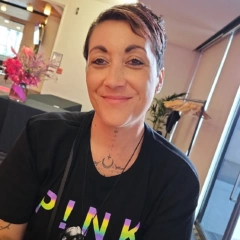“I’ll give it a good shot”
“When you’re a farmer, you’re used to hearing the worst and hoping for the best…”
Farming is in Peter Morton’s blood. Born and bred in Dunedin, he finished school in 1972 and moved to his family’s farm in Central Otago to work alongside his uncles. They had taken over the farm from Peter’s grandfather, who first began farming the land in 1921. Now, after running the farm for much of his life, Peter has passed the baton to his own kids.
Although he still likes to help out around the farm (in Peter’s words, “there’s nothing nicer than getting out with some dogs and shifting some sheep”), he and his wife, Sue, are finally enjoying their retirement together. But it’s looked a bit different to how they’d imagined it – in 2023 Peter was diagnosed with myeloma, although his health journey started well before that.
“When Sue and I were first together, I had my 50th birthday and she sent me along for a WOF to make sure she was going to get longevity out of me,” Peter laughs.
Tests picked up unusually high protein levels in his blood, and he was diagnosed with monoclonal gammopathy of undetermined significance (MGUS), a benign condition that doesn’t require treatment. For the next 20 years, he was sent for annual blood tests to keep an eye on his protein levels, but otherwise carried on with life as normal.
“During that time, I seemed to end up with every cold and flu that came around. When we went on holiday, I’d invariably pick up either a sinus infection or a flu bug, and twice I’ve had pneumonia while I’ve been overseas.”
This second bout of pneumonia happened during a trip to Canada in 2023. When Peter got back from the holiday in August, he was due for his annual blood test to check his protein levels. “My numbers were elevated at that stage,” he says. “But I thought it might have had something to do with the pneumonia.”
In November, Peter headed down to Dunedin for some more tests and a haematologist appointment. “We went to the specialist, and he handed me a whole plan for how I’m going to attack the myeloma I’ve got, and I’m thinking, ‘No one’s even told me this – I’ve only come here for a test!’ That was one hell of a shock.”
Not long after his diagnosis, Peter was out splitting wood with his son. Slabs of wood that he’d been able to lift just days prior were suddenly impossible to pick up. “The next day, I couldn’t even get out of bed. I was locked up between my shoulder blades and in my lower back, and I couldn’t do anything.”
An X-ray revealed he had three fractures in his spine.
“After all that happened, the myeloma really started to take off. So my haematologist said it was time for us to do something. No argument.”
Peter was advised that due to his age, a stem cell transplant wasn’t recommended. Instead, he was entered into a clinical trial where he could use lenalidomide as a first-line treatment, along with steroids and chemotherapy.
Last winter was tough going. Twice, Peter became extremely unwell and needed to be rushed to the hospital. He missed a special dinner celebrating 100 years of the family farm and couldn’t make it on a trip they’d planned for Sue’s birthday. He was dealing with severe back pain and struggling to get out of the house.
During this time, he leaned heavily on his local LBC support group in Cromwell. Peter and Sue had started attending the group, run by Deb from LBC, even before Peter’s diagnosis had progressed to active myeloma. They say it has been a huge source of support as Peter has navigated this new stage of his condition.
“There was one guy in particular who got diagnosed with exactly the same thing as me, and he’s gone through hell, but now he’s out the other side – no treatment, no nothing. When you’re at your lowest point, you look for the highest thing to aim for. So I think, ‘If he can do it, I’ll give it a good shot.’”
Peter has also been astounded by the support he’s received from his community when he’s been too unwell to work on the farm. Last year, when all the ewes needed to be scanned for pregnancy, a big group of local guys turned up to help. “There were 4000 sheep to go through, and it was cold. It was wet. It was miserable. And I was sitting here in front of the fire.”
Peter recently finished his last round of chemotherapy. He’s still taking lenalidomide and a steroid, and will continue with regular monitoring. “The protein level is still going down at this stage. If it starts to elevate, then that’s a bit scary, and the doctor has said the outlook’s not great if that happens. We should know where we are by Christmas time.”
In February, Peter ended up back in the hospital – this time after being trampled by a cow and breaking multiple bones. While this might’ve been the last straw for many, Peter is unlikely to stop helping on the farm any time soon.
“You can tell that farming is his passion,” says Sue. “He lives for the farm, and for trying to leave it in good hands for the ones coming up.”





